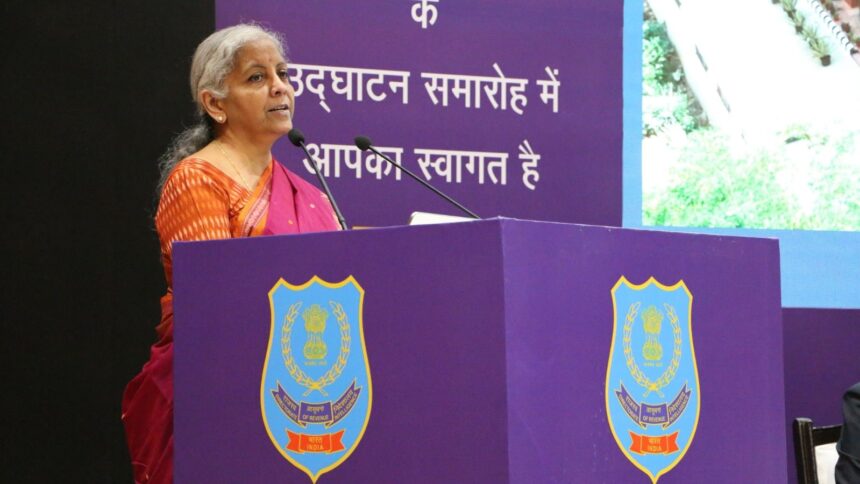Gold smuggling may figure higher up in anti-smuggling conversations, but it is the pilferage and smuggling of narcotics that poses the biggest threat to India today, Union Finance Minister Nirmala Sitharaman said Tuesday. Having made inroads into every state and small towns, with schools and colleges now becoming increasingly exposed to this threat, Sitharaman said that in such cases, coordination with state enforcement authorities is a grey area that needs to be discussed further. Greater coordination with enforcement authorities in the states, she said, is needed to expedite on-ground action in such cases.
“As much as we speak about gold, narcotics is the biggest threat I would think today, which has infiltrated into every state and even small mofussil towns. Schools and colleges are the first victims. You hear from so many different states that schools are being targeted now by drug traffickers, drug peddlers. It is first to be stopped by the DRI (Directorate of Revenue Intelligence). And, it is, of course, then coordinated, to be worked with the state police officials as well,” she said at an event to mark the inauguration of the new headquarters building of the DRI in .
The Finance Minister said there is need for greater coordination and greater understanding. “…even if you understand the size and scope of the threat, do the state officials, law enforcement agencies, do they get a picture of the gravity of the situation? Do they act on it? That is the other side of action on which a lot more thought and discussion should happen. As much as I said actionable input, coordination with state law enforcement agencies, is the grey area. I see that today, even if you are able to stop such nefarious activities, the end result in the ground takes its own traction and that has to be expedited,”
Sitharaman also said that as much as the revenue intelligence authorities are detecting smuggling and achieving success, there are “clearly many more (cases) happening, which go unnoticed” and there is need for more alertness. “I’m not saying that is a shortfall from your side, but that is the extent to which global agencies are doing such nefarious activities. We need to have greater alertness,” she said.
She underlined the importance of actionable intelligence, calling for a meaningful exchange of information between agencies. “Intelligence dumped on agencies or enforcement agencies by itself is a work done, no doubt. But, from the dump of data, or the cache of data which arrives, it is important for agencies to be smart enough to see, which is the one which has got to be actionable and which has to be immediately taken up. So, there is that area which I would still call a grey area and between agencies there should be a far more meaningful way in which we are able to exchange information but yet act on those which are going to be absolutely timely and critical… there should be a more meaningful way in which time and effort is optimised by sharing and acting equally,” she said.
‘No good if you catch the small fish or fry’
The Finance Minister also told the revenue intelligence officers that it’s “no good if you catch the small fish or fry”, urging them to act upon the entire smuggling chain, take the investigations to a logical conclusion to find the masterminds, dismantle the syndicates and get them punished. She enlisted three points for enforcement agencies to be effective: first, to not view enforcement and facilitation as opposing ends of the spectrum; second, to investigate holistically, keeping the big picture in focus, not merely to chase isolated infractions; and third, to ensure enforcement operations are rooted, not only in data, but also in dharma.
In order to be effective enforcement agencies, all officers must embrace three key imperatives:
✅Do not view enforcement and facilitation as opposing ends of the spectrum.
✅Investigate holistically, keeping the big picture in focus, not merely chasing isolated infractions.…
— Office (@nsitharamanoffc)
“Robust intelligence framework that detects fraud is essential not just to catch wrongdoers, but to create a level playing field for honest trade. Rules must be applied fairly and consistently. And frauds must be caught swiftly in order to have legitimate businesses thrive and confidence in our trade system to deepen,” she said.
Sitharaman said it is important to leverage all available information and data on an entity, on an individual, and their behavioural patterns to uncover deeper, systemic risks, and threats, by connecting latent dots. “True intelligence is not just about seeing what others cannot. It’s about seeing before others do. And just as I said, you see it before others do. But would you make others act on it as soon as you see it? It is equally important. The goal must be to dismantle the entire network and the syndicate not just to intercept fragments”
“I think this is one line which I’ve repeated in every one of my addresses to CBIC: No good if you catch the small fish or fry. The bigger ones are the ones who were there, not being touched by many of our actions. We need to have the entire value chain as they would call the entire smuggling chain, the entire nefarious operations chain, tracked and acted upon. It’s not easy I know, and I wouldn’t mind repeating it any number of times, but we should show some tangible results on it,” she said.
‘Enforcement operations should be rooted, not only in data, but also dharma‘
Enlisting the third and the “most important point”, Sitharaman said the enforcement operations should be rooted, not only in data, but also in dharma. “Actions must be unyielding but also just actions are necessary. Because when smuggling is stopped and fraud is exposed, judiciously acted upon as well, it helps move from a fear-driven compliance to a value- and a trust-based compliance environment. And that is why this is very important for us to follow. I urge every officer to keep their minds agile, values anchored and also visions elevated,” she said.
Noting the evolving geopolitical and trade landscape, she also said that the use of modern technology will have to be more deeply and well integrated into systems and data analytics. “A lot of talk on AI, but I would want to see . I said this before, but I repeat it. It’s very important to have seamless inter-agency coordination, stronger international partnerships and very important is the continuous reinvention of ways in which you act on what you have to do,” she said.








